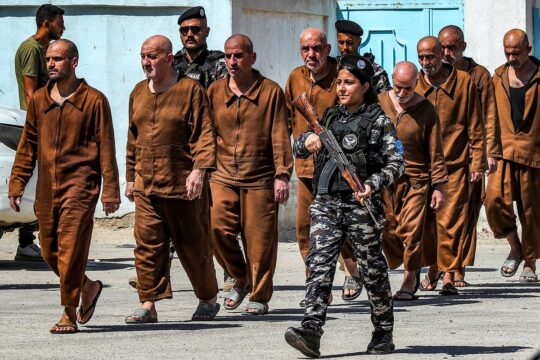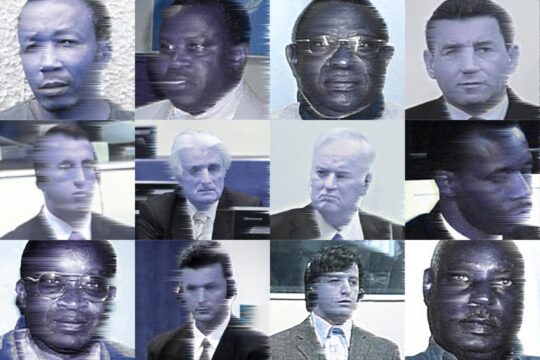The International Commission on Missing Persons (ICMP) was marking its 20th anniversary on July 7 in The Hague, where it recently set up offices. The Commission, established in 1996 on an initiative from President Bill Clinton after the war in former Yugoslavia, has identified more than 22,000 missing persons in Bosnia-Herzegovina, allowing their friends and relatives to grieve, obtain justice and try to get reparations. Since 2003, when it sent a first mission to Iraq, the organization has gradually extended its field of action and now works on all missing persons, whether they be victims of war, natural disaster or human trafficking. In December 2014, the Commission’s statute changed from an association to an institution through a treaty signed by nine States, allowing it to adopt a global strategy. ICMP Director Kathryne Bomberger told our Hague correspondent Stéphanie Maupas in this interview that the issue of missing persons remains under-estimated and is not just a humanitarian issue.
JusticeInfo: How many missing persons are there in the world today?
Kathryne Bomberger: There are no global statistics. There were 40,000 missing persons during the conflicts in former Yugoslavia, including 30,000 for Bosnia-Herzegovina alone, 65,000 in Colombia, 60,000 in Syria, and also in other countries like Kashmir, Nepal, Uganda and elsewhere. Right now we are managing 150,000 biological profiles, from the tsunami in Thailand, from Hurricane Katrina, from the Bosnian conflict, from Iraq, South Africa, Chile and Libya. It’s a global problem. We were able to learn with Bosnia, with its citizens, with their governments, that you can find missing persons. Today we have the tools, we have the legal status. But one has to understand that a large number of missing persons poses a threat to the peace and stability of States. If you have a large number of missing persons, particularly when people have been forcibly disappeared by State actors and those individuals are still in power when the conflict ends, you have an enormous gap between the survivors and the States. This can only be addressed by the States taking responsibility. If not, victims and society left behind will never be able to rebuild trust in the State. And I think that people fail to recognize this even in Syria right now. After persons have food and shelter, they want to know where their loved ones are. If the State doesn’t provide the answer, you will have a gap forever. It is more than a humanitarian issue.
JusticeInfo: You are lobbying for attention on missing persons in the Syrian conflict. How far have you got with documenting this?
KB: We could start now, and even now is late, to build trust with the survivors. As an organization that can work with them, go out in the field and collect data from their relatives, we can store that data, protect that data, and that data will be available when the conflict is over, to begin the process of assisting whatever the new Syria will be. But so much of what we do depends on the survivors. Today you don’t need to go to the field with a pen and paper any more. We now have a website, which will allow families of the missing to put data from anywhere.
Syria will take a long time, and the migration crisis is linked to the Syrian problem. Now, you don’t have only people missing from the regime of Hafez Al-Assad, numbering some 17,000, but also around 40,000 from the current war, and from the migration crisis and trafficking. In Bosnia, we were able to collect missing persons’ information from 100,000 families of the missing, so this is what we want to do in Syria and what we would want to do in the migration crisis.
JusticeInfo: Your organization proposes to intervene in the migration crisis. What is it proposing?
KB: According to IOM, out of 7 billion people on Planet Earth, 1 billion are on the move; if they are on the move, they are under the radar. Developing this mechanism is important, helping Italy, Greece and other European states. Families are now fleeing conflict in Syria or political persecution in the Horn of Africa. If they are here, in Europe, they have rights. Many of them are now taking their case to Strasbourg. Nearly 10,000 children have disappeared, which is catastrophic. Where are they? There are no mechanisms now in place to search for them. We are trying to reach agreements with IOM, Frontex, Interpol and also hopefully the UNHCR, institutions that are at the frontline dealing with this issue, but also with states like Italy and Greece. We have an agreement with Italy, with IOM and we are trying to pursue funding from the EU. We are finding ways to eliminate the political no, by saying it’s actually not so expensive, it’s actually not so terrible if you do this and it is about good governance in the end. Even the fact that some Syrian families have taken their case to Strasbourg is pretty new. I hope this trend will continue. We as human beings have to be made aware of the fact that it is important to find your missing loved ones. It affects the fabric of society in many ways, but particularly in a post conflict setting.
There is a new technology that will allow you to see genetic markers so you can tell what part of the world the person may have come from. If you receive, for example, a post mortem sample from Italy, maybe we can tell if the person came from Central Africa or Afghanistan, which helps you know where you might look for survivors. It’s just starting, really.
JusticeInfo: You participated in several trials before the International Criminal Tribunal for former Yugoslavia, including that of Bosnian Serb political leader Radovan Karadzic. What lessons do you draw from that?
KB: It is a big step that we were able to cooperate with the International Criminal Tribunal for the former Yugoslavia, because we provided evidence in 30 criminal trials. In many parts in the world, the families are under threat, they are very afraid to go public about reporting a missing person. When there is no fear anymore, and the family feels they can be open about demanding answers, then they talk. The 7,000 memorial stones in Potocari, Srebrenica, are a testament to the facts. We are signing an agreement with the Office of the Prosecutor [of the International Criminal Court] on July 7 similar to the one with the ICTY. And if, for example, if we are able to reach an agreement with Côte d’Ivoire to work with them on finding persons missing after the 2010 elections, we could help them to excavate mass graves sites. Evidence will hopefully be useful for their domestic trials and the ICC.
JusticeInfo: In your work, you talk about the difficulties of making States understand impartiality in the search for the missing. Can you explain?
KB: We are trying to say to States that they should be impartial. States find it difficult to be impartial in searching for missing persons regardless of their ethnic, religious or national origin, political orientation, gender or role during the conflict. In Libya, we had problems initially. Earlier there was a commission on missing persons, during the first transitional government. But they dissolved that commission and created something like the ministry for martyrs and missing persons. Who are the martyrs? We said that we only work with you if you guarantee that you will find everyone, regardless of whether they fit the category of martyrs or not. And we received those assurances.
This was the key in Bosnia. There are still people who say ‘why should missing soldiers be found, the ones who killed our family?’ This will be the same tomorrow in Syria. The son of an ISIS fighter will be looking for his father and we will have to find him. The rights of the survivors are equal. Justice for all, it’s a very difficult proposition. States may want to find certain missing persons over other missing persons, but in the end you never know who you are going to find and you are dealing largely with skeleton remains in many cases. That’s the beauty of DNA, we can prove you are wrong. There is still the political narrative in the Balkans, but we also have facts, based on science. In Bosnia, it’s interesting to see that the narrative of denial is also changing, the more facts we have. It is one thing for us to say we identified 7,000 persons in Srebrenica. We want the State to say that, for justice to be done and for survivors to be able to claim their rights. That’s the end game.






